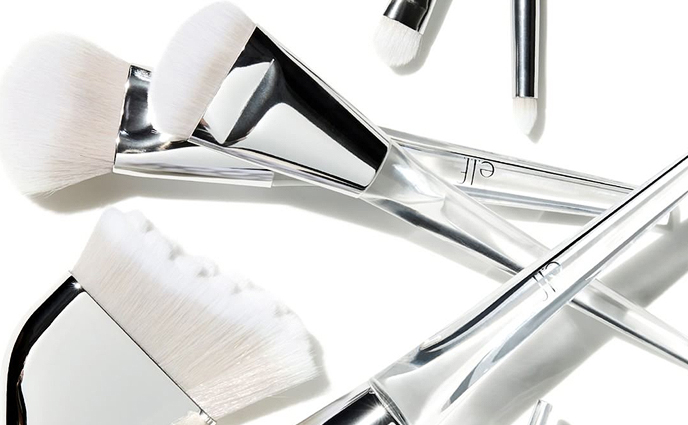Lightly rub the brush on a washcloth or towel (one that's specifically reserved for this use, and this use only.) While this quick fix isn't necessarily enough to get rid of germs, it's sufficient to remove excess product and will help extend the length of time you can go between deeper cleans, says Patinkin. Just avoid using paper towels or tissues if your brushes have natural bristles: "Paper products contain tiny fibers of wood pulp that can get into the porous natural hairs and dry them out," she explains.
Image via dwellinbeauty.blogspot
Image via dwellinbeauty.blogspot
To quickly address the germy component, a brush cleansing spray is the laziest way to clean makeup brushes, says Patinkin, who likes Japoneseque Makeup Brush Cleanser, $14. "It contains alcohol to sanitize, but also conditions the bristles so that they won't dry out," she says. Just spritz lightly, since ODing on the spray can leave behind an unwanted residue. Patinkin advises using only one to two spritzes and holding the bottle six inches away from the brush. Don't feel like buying an extra product? When he doesn't have a makeup brush cleaner handy, Scibelli wipes his brushes on fragrance-free face wipes for a similar effect. Try: Neutrogena Makeup Remover Cleansing Towelettes, $6.49.
Image via newgrl.com
Image via newgrl.com
While quick wipes and spritzes are great for day-to-day, you'll occasionally need to wash makeup brushes thoroughly. "In theory, once a week is ideal, but in reality, aim for every three to four weeks," suggests Patinkin. (The one caveat: If you're dealing with active breakouts or things like styes or cold sores, a weekly makeup brush cleanse is mandatory.)
Not sure how to get started? Here's how to clean makeup brushes the right way. If you're using a solid formula, wet the brush, then rub it right onto the soap. Liquid? Add a few drops into a mug filled one-third of the way with warm water and swirl the bristles in the suds. Scibelli also likes using Sigma Spa Brush Cleaning Mat, $32, a textured rubber mat that deep cleans bristles. No matter what, the most important thing is to avoid getting water into the ferrule, the part of the brush that connects the bristles with the handle; this can loosen the glue and ruin the brush, cautions Patinkin.
Not sure how to get started? Here's how to clean makeup brushes the right way. If you're using a solid formula, wet the brush, then rub it right onto the soap. Liquid? Add a few drops into a mug filled one-third of the way with warm water and swirl the bristles in the suds. Scibelli also likes using Sigma Spa Brush Cleaning Mat, $32, a textured rubber mat that deep cleans bristles. No matter what, the most important thing is to avoid getting water into the ferrule, the part of the brush that connects the bristles with the handle; this can loosen the glue and ruin the brush, cautions Patinkin.
There's no shortage of makeup brush cleansers out there, not to mention a slew of brush-cleansing hacks to be found on the internet. Patinkin and Scibelli both like solid formulas, like the Takeda Brush Purely Soap, $14, and the BeautyBlender BlenderCleanser Solid, $16.
As far as liquids go, you may have heard that baby shampoo is a good choice: "It's OK in that it's gentle, but it doesn't really cut oil effectively," says Patinkin. She prefers gentle detergents, like Woolite or Dreft, which both get rid of oil and condition bristles. And while we'd never dream of bashing coconut oil, cleaning makeup brushes may be the one thing it's not good for (it leaves behind a greasy residue that's super hard to rinse off, Patinkin explains). Also, puh-lease don't put your brushes in the dishwasher. "Not only can the heat loosen the glue that holds the brush together, but it can also up the likelihood of bacterial growth if not every last germ has been killed," warns Patinkin.
Image via itsalisa.files.wordpress.com
As far as liquids go, you may have heard that baby shampoo is a good choice: "It's OK in that it's gentle, but it doesn't really cut oil effectively," says Patinkin. She prefers gentle detergents, like Woolite or Dreft, which both get rid of oil and condition bristles. And while we'd never dream of bashing coconut oil, cleaning makeup brushes may be the one thing it's not good for (it leaves behind a greasy residue that's super hard to rinse off, Patinkin explains). Also, puh-lease don't put your brushes in the dishwasher. "Not only can the heat loosen the glue that holds the brush together, but it can also up the likelihood of bacterial growth if not every last germ has been killed," warns Patinkin.
Image via itsalisa.files.wordpress.com
If even those simple makeup brush cleansing techniques seem far too challenging, there's an option for the laziest of all of us: Enter the Lilumia 2, $159, which takes all the elbow grease out of cleaning makeup brushes. Pop up to 12 brushes into the egg-shaped device and it automatically washes them in just 15 minutes, while you do something more productive with your time. Yes, it's as easy as that. What's your excuse now?





